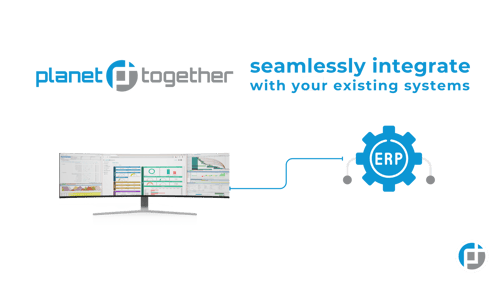Tariff Turbulence: How Purchasing Managers in Pharma Can Stay Ahead with Smart Integration
In an increasingly globalized pharmaceutical industry, procurement professionals must do more than negotiate prices and manage supplier relationships. They must also navigate an evolving web of trade policies and regulatory landscapes. One of the most pressing and often unpredictable factors in this realm is tariffs.
Tariffs—taxes imposed on imported goods—can significantly influence the cost structures, sourcing decisions, and overall supply chain stability of pharmaceutical manufacturers. For Purchasing Managers, this creates a dual challenge: securing cost-effective raw materials while maintaining regulatory compliance and consistent supply in the face of shifting trade landscapes.
In this blog, we explore how tariffs affect the dynamics of procurement in pharmaceutical manufacturing, and how leveraging advanced planning tools like PlanetTogether APS, integrated with enterprise systems such as SAP, Oracle, Microsoft, Kinaxis, or Aveva, can help mitigate risks and drive strategic decision-making.

The Global Nature of Pharmaceutical Procurement
Pharmaceutical manufacturing is highly dependent on a vast network of global suppliers. Active Pharmaceutical Ingredients (APIs), excipients, packaging materials, and other critical components often come from multiple countries—each with its own trade policies. A single change in tariff rates or a new trade agreement can ripple through procurement budgets and production timelines.
Key challenges include:
Price Volatility: Tariffs can drive up costs overnight, eroding margins and rendering long-term contracts less favorable.
Supplier Diversification Pressures: Manufacturers must often source from multiple geographies to hedge against risk, increasing logistical complexity.
Compliance Concerns: Regulatory variations across regions can impact procurement timelines and increase the risk of penalties.
The Direct Impact of Tariffs on Procurement Strategy
Cost Management and Budgeting
Tariffs introduce uncertainty in cost forecasting. For Purchasing Managers who rely on predictable pricing to manage budgets and plan purchases, sudden tariff increases can wreak havoc. When an essential raw material is subject to a new tariff, the cost impact must be absorbed either by the company or passed down the supply chain—often resulting in tension between cost, quality, and supply continuity.
Supplier Selection and Sourcing Strategy
In response to tariff-related cost increases, Purchasing Managers are often forced to re-evaluate their sourcing strategies. This might mean:
Shifting to domestic or tariff-exempt suppliers (which may lack the same capacity or quality)
Investing in dual or multiple sourcing models
Reassessing just-in-time (JIT) strategies in favor of more resilient inventory models
Inventory Planning and Lead Times
With tariffs contributing to longer customs clearance and unpredictable freight costs, procurement must consider the effects on lead times. Holding additional inventory might become necessary, but this increases carrying costs and risks obsolescence—especially in the pharmaceutical sector where shelf-life and storage conditions are tightly regulated.

The Strategic Role of Advanced Planning and Scheduling (APS)
To manage these challenges, pharmaceutical manufacturers are increasingly turning to Advanced Planning and Scheduling (APS) systems like PlanetTogether. These tools, especially when integrated with ERP systems such as SAP, Oracle, Microsoft Dynamics, Kinaxis, or Aveva, provide the real-time visibility and agility needed to navigate a tariff-sensitive environment.
Key benefits include:
Real-Time Cost Analysis and Forecasting
With an integrated APS system, Purchasing Managers can model various tariff scenarios and understand their immediate and long-term effects on production costs. For example, by syncing PlanetTogether with SAP or Oracle, organizations can:
Run "what-if" scenarios for supplier pricing under different tariff regimes
Simulate cost impacts across different supplier geographies
Adjust procurement schedules based on cost optimization
Smarter Supplier and Contract Management
Integration between PlanetTogether and ERP systems enables seamless supplier management. Purchasing Managers can:
Monitor supplier performance against new cost metrics
Adjust contracts in real-time to account for tariff-induced changes
Identify alternate suppliers with lower exposure to trade risks
This proactive approach helps avoid last-minute surprises and promotes more strategic vendor relationships.
Improved Inventory Planning and Risk Management
Using PlanetTogether’s scheduling capabilities, procurement teams can anticipate disruptions and optimize stock levels. This is especially useful when combined with Kinaxis’ or Microsoft Dynamics’ demand forecasting tools. Together, these systems allow for:
Buffer inventory modeling to counteract customs delays
Risk-adjusted safety stock calculations
Better coordination with production and logistics
Enhanced Compliance and Audit Readiness
Pharmaceutical procurement doesn’t operate in a vacuum. Any adjustments made to suppliers or materials must align with strict regulatory requirements. Integration with compliance modules in platforms like Aveva ensures that any procurement changes driven by tariffs still meet Good Manufacturing Practice (GMP) standards and FDA requirements.

The Path Forward: Building a Tariff-Resilient Procurement Strategy
The unpredictability of global trade means that tariff exposure is now a standard procurement consideration—not an occasional exception. For Purchasing Managers in pharmaceutical manufacturing, the strategic path forward includes:
Investing in integrated planning tools like PlanetTogether to improve visibility, responsiveness, and cost control.
Leveraging ERP-APS integration to break down silos between procurement, production, and compliance.
Adopting flexible sourcing models to mitigate supply risk.
Developing tariff contingency plans based on real-time data, not just historical assumptions.
Tariffs are not going away. In fact, as nations become more protectionist and pharmaceutical supply chains more scrutinized, the impact of tariffs on procurement will only grow. Rather than react to each trade change in isolation, pharmaceutical Purchasing Managers must adopt a strategic, technology-enabled approach.
With PlanetTogether APS integrated into enterprise platforms like SAP, Oracle, Microsoft, Kinaxis, or Aveva, procurement becomes proactive—not just reactive. This allows for smarter sourcing, cost-effective decision-making, and a resilient supply chain that thrives even under pressure.
Are you ready to take your manufacturing operations to the next level? Contact us today to learn more about how PlanetTogether can help you achieve your goals and drive success in your industry.
Topics: PlanetTogether Software, Integrating PlanetTogether, Pharmaceutical Manufacturing, Build Resilient Supply Chains, Predictive Analytics for Smarter Sourcing, Cost-Effective Decision-Making, Supplier Selection and Sourcing Strategy, Real-Time Cost Analysis and Forecasting





















LEAVE A COMMENT